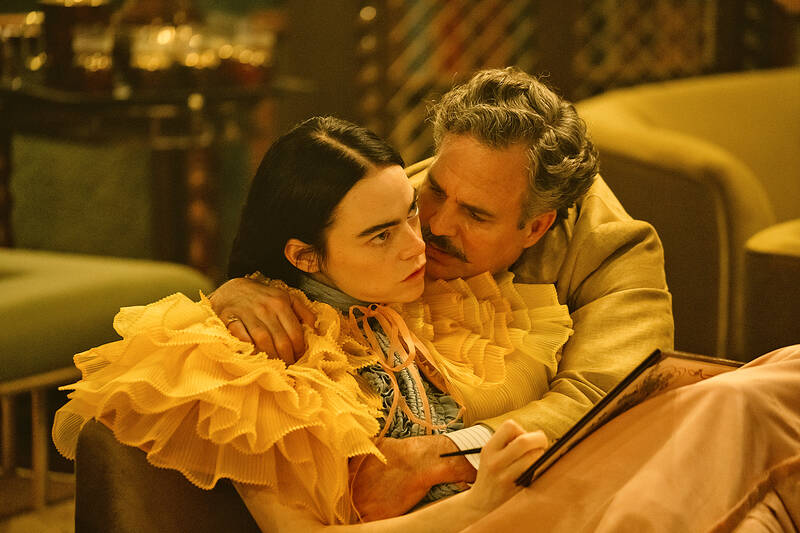It is sickly hilarious to make a movie in which so much consensual sex is had, often so gleefully, that is not the least bit sexy. Though Bella Baxter’s insatiable libido might be her guiding light at first in Poor Things, sexual liberation (or “furious jumping,” as she calls it) is only part of this fantastical, anarchic journey to consciousness.
Filmmaker Yorgos Lanthimos and his star, Emma Stone, have a good and strange thing going whether she’s playing a striving scullery maid who works her way into the favor of Queen Anne, or a re-animated Victorian woman finding independence. Stone helps make his black humor more accessible, and he creates unorthodox opportunities for her to play and stretch. We, the audience, are the benefactors.
Poor Things was not a whole cloth invention. It is an adaptation of Alasdair Gray’s 1992 novel, done by The Favorite screenwriter Tony McNamara whose edges and wit haven’t dulled and in fact flourishes outside the cruelty of the previous film. Don’t worry, the humor is plenty dark here, but self-actualization looks good on them.

Photo: AP
In this depraved and not so subtle fairy tale, men see Bella as a thing to possess and control. Her creator, Dr Godwin Baxter (Willem Dafoe), a mad scientist with violent scars all over his face from a childhood as test subject for his own father, wants to hide her away from the corrupting influences of the world. His horrified student Max McCandles (Ramy Youssef), enlisted to study Bella, wants her to be his wife. And the dandy attorney Duncan Wedderburn (Mark Ruffalo) sees a sex doll, someone with the potential to be as wild and adventuresome as him and eschew the conventional stuffiness of their time. Everyone assumes that Bella will not be too much of a problem. And everyone is wrong.
It wouldn’t be a Lanthimos movie without some immense, irreconcilable discomfort, like using a highly sexualized woman with the mind of a toddler for comedic purposes. But this is hardly the first fairy tale to exploit its heroine for her innocence or naivete. Does it make it better if that’s the point? Is it making light of second-degree rape? Is it the film’s responsibility to answer to? Or is this the prickly post-film debate that everyone is supposed to be having? That is something only the individual can answer.
Stone moves like a doll who hasn’t quite figured out she has joints yet and talks in incomplete, childish sentences. She is not actually mimicking a toddler, it’s something weirder and more fantastical than that. In La La Land she moved as though walking on air. In Poor Things, there is a marionette quality.

Photo: AP
And Bella evolves quickly. She learns to walk and speak and think and masturbate and dance and read and philosophize about inequalities. It does not ever occur to her to not do, or say, exactly what she pleases in this opera of appetites. And her evolution is appropriately messy, taking her to Portugal, Alexandria and Paris, as she figures out her likes and dislikes. You almost want to see her go up against the mean teens in Barbie. Social mores really are the dullest things.
This story exists in a Victorian dream/nightmare, a vision so stuffed with fantasy it reminded me of The Adventures of Baron Munchausen. But it is undoubtedly among the year’s most sumptuous visual delights with production design by James Price and Shona Heath, and costumes by Holly Waddington. Lanthimos and cinematographer Robbie Ryan again employ the fisheye lens that they used in The Favorite. It’s extra, but at least it makes more sense in this purposely disorienting world.
While it is Stone’s movie, all the supporting men are exemplary and unexpected, especially Ruffalo who is so deliriously fun and funny that it’s almost criminal that he hasn’t been unleashed like this before.

Photo: AP

On April 26, The Lancet published a letter from two doctors at Taichung-based China Medical University Hospital (CMUH) warning that “Taiwan’s Health Care System is on the Brink of Collapse.” The authors said that “Years of policy inaction and mismanagement of resources have led to the National Health Insurance system operating under unsustainable conditions.” The pushback was immediate. Errors in the paper were quickly identified and publicized, to discredit the authors (the hospital apologized). CNA reported that CMUH said the letter described Taiwan in 2021 as having 62 nurses per 10,000 people, when the correct number was 78 nurses per 10,000

As we live longer, our risk of cognitive impairment is increasing. How can we delay the onset of symptoms? Do we have to give up every indulgence or can small changes make a difference? We asked neurologists for tips on how to keep our brains healthy for life. TAKE CARE OF YOUR HEALTH “All of the sensible things that apply to bodily health apply to brain health,” says Suzanne O’Sullivan, a consultant in neurology at the National Hospital for Neurology and Neurosurgery in London, and the author of The Age of Diagnosis. “When you’re 20, you can get away with absolute

May 5 to May 11 What started out as friction between Taiwanese students at Taichung First High School and a Japanese head cook escalated dramatically over the first two weeks of May 1927. It began on April 30 when the cook’s wife knew that lotus starch used in that night’s dinner had rat feces in it, but failed to inform staff until the meal was already prepared. The students believed that her silence was intentional, and filed a complaint. The school’s Japanese administrators sided with the cook’s family, dismissing the students as troublemakers and clamping down on their freedoms — with

As Donald Trump’s executive order in March led to the shuttering of Voice of America (VOA) — the global broadcaster whose roots date back to the fight against Nazi propaganda — he quickly attracted support from figures not used to aligning themselves with any US administration. Trump had ordered the US Agency for Global Media, the federal agency that funds VOA and other groups promoting independent journalism overseas, to be “eliminated to the maximum extent consistent with applicable law.” The decision suddenly halted programming in 49 languages to more than 425 million people. In Moscow, Margarita Simonyan, the hardline editor-in-chief of the